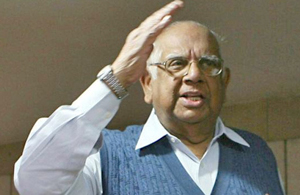New Delhi, Feb 5: Following is the chronology of events in the 2012 Nirbhaya gang rape and murder case in which the Delhi High Court on Wednesday said the all the four convicts have to be hanged together, not separately.
- Dec 16, 2012: Paramedical student gang-raped and brutally assaulted by six men in a private bus and thrown out of the moving vehicle along with her male friend. The victims admitted to Safdarjung Hospital.
- Dec 17: Widespread protests erupt demanding stringent action.
- Police identify the accused - bus driver Ram Singh, his brother Mukesh Kumar, Vinay Sharma and Pawan Gupta.
- Dec 18: Ram Singh and three others arrested.
- Dec 20: Victim's friend testifies.
- Dec 21: A delinquent juvenile nabbed from Anand Vihar bus terminal in Delhi. Victim's friend identifies Mukesh as one of the culprits. Police conduct raids in Haryana and Bihar to nab the sixth accused, Akshay Kumar.
- Dec 21-22: Akshay arrested in Aurangabad district of Bihar and brought to Delhi. Victim records statement before the SDM in hospital.
- Dec 26: Following a cardiac arrest, victim flown to Singapore's Mount Elizabeth Hospital by the government.
- Dec 29: Victim succumbs to injuries and other medical conditions. Police add murder charge in the FIR.
- Jan 2, 2013: The then Chief Justice of India Altamas Kabir inaugurates fast track court (FTC) for speedy trial in sexual offence cases.
- Jan 3: Police file charge sheet against five adults accused of murder, gang-rape, attempt to murder, kidnapping, unnatural offences and dacoity.
- Jan 17: FTC starts proceedings against the five adult accused.
- Jan 28: Juvenile Justice Board (JJB) says minority of the juvenile accused is proved.
- Feb 2: FTC frames charges against five adult accused.
- Feb 28: JJB frames charges against the minor.
- Mar 11: Ram Singh commits suicide in Tihar Jail.
- Jul 8: FTC completes recording of testimonies of prosecution witnesses.
- Jul 11: Delhi High Court allows three international news agencies to cover the trial in the case.
- Aug 22: FTC begins hearing final arguments in trial against four adult accused.
- Aug 31: JJB convicts the minor for gang-rape and murder and awards three-year term at probation home.
- Sep 3: FTC concludes trial. Reserves verdict.
- Sep 10: Court convicts Mukesh, Vinay, Akshay, Pawan of 13 offences including gang-rape, unnatural offence and murder of the girl and attempt to murder her male friend.
- Sep 13: Court awards death penalty to all 4 convicts.
- Sep 23: HC begins hearing the convicts' death sentence reference sent to it by the trial court.
- Jan 3, 2014: HC reserves verdict on convicts' appeals.
- Mar 13: HC upholds death penalty to the 4 convicts.
- Mar 15: SC stays execution of 2 convicts, Mukesh and Pawan, after they file appeals. Later, stays execution of other convicts also.
- Apr 15: SC directs police to produce the dying declaration of the victim.
- Feb 3, 2017: SC says it would hear afresh the aspect of awarding death penalty to the convicts.
- Mar 27: SC reserves verdict on their appeals.
- May 5: SC upholds death penalty to four convicts, says the case falls under the category of 'rarest of rare' and the offence created "tsunami of shock".
- Nov 8: Mukesh, one of the four death row convicts in the case, moves SC seeking review of its verdict upholding the capital punishment awarded to him.
- Dec 12: Delhi Police opposes Mukesh's plea in SC.
- Dec 15: Convicts Vinay Sharma and Pawan Kumar Gupta move SC for review of its verdict.
- May 4, 2018: SC reserves order on review plea of Vinay and Pawan.
- Jul 9: SC dismisses review pleas of three convicts.
- Feb, 2019: Victim's parents move Delhi court for issuance of death warrants of the four convicts
- Dec 10, 2019: Akshay moves plea in SC seeking review of his death penalty.
- Dec 13: Victim's mother moves SC opposing review plea of convict
- Dec 18: SC dismisses Akshay's review plea.
- Delhi govt seeks death warrants for execution of death sentence to the 4 convicts
- Delhi court directs Tihar authorities to issue notice to convicts to avail their remaining legal remedies.
- Dec 19: Delhi HC dismisses plea of Pawan Kumar Gupta claiming he was a juvenile at the time of the offence.
- Jan 6, 2020: Delhi court dismisses complaint filed by Pawan's father seeking FIR against sole witness
- Jan 7: Delhi court orders 4 convicts to be hanged on January 22 at 7 am in Tihar jail.
- Jan 14: SC rejects curative petition of Vinay and Mukesh Kumar.
Mukesh files mercy petition before President
- Jan 17: President Ram Nath Kovind rejects mercy plea of Mukesh.
- Trial court issues death warrants again with execution date as February 1, 6 am.
- Jan 25: Mukesh moves SC against rejection of mercy plea.
- Jan 28: SC hears arguments, reserves verdict
- Jan 29: Convict Akshya Kumar approaches SC with curative petition
- SC rejects plea of Mukesh challenging rejection of his mercy plea.
- Jan 30: SC dismisses curative plea of Akshay Kumar Singh.
- Jan 31: SC dismisses plea filed by Pawan seeking review of its order rejecting his juvenility claim.
- Delhi court again postpones execution of the black warrants till further order.
- Feb 1: Centre moves HC against the trial court order.
- Feb 2: HC reserves judgement on Centre's plea.
- Feb 5: HC dismisses Centre plea against trial court order; says all 4 convicts have to be hanged together. It directs the convicts to pursue all legal remedies within a week, failing which the authorities ordered to take action in accordance with law.






Comments
Add new comment